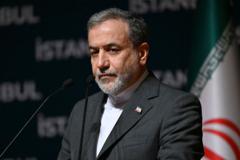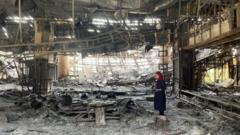Iran's Foreign Minister, Abbas Araghchi, has publicly acknowledged that "excessive and serious" damage has been inflicted on the nation's nuclear sites due to recent U.S. and Israeli airstrikes. In an interview with a state broadcaster, Araghchi stated that an assessment of the damage is currently underway by the Atomic Energy Organization of Iran. This announcement follows a contrasting statement from Iran's Supreme Leader, Ayatollah Ali Khamenei, who claimed that these strikes did not compromise the country’s nuclear ambitions.
Iranian Foreign Minister Acknowledges Severe Damage to Nuclear Facilities

Iranian Foreign Minister Acknowledges Severe Damage to Nuclear Facilities
Iran's nuclear program faces threats amid conflicting statements from its leaders.
Khamenei reacted to U.S. President Donald Trump's claims of significant damage, asserting that the attacks had not "accomplished anything significant," and he emphasized that Trump was exaggerating the situation. Despite this rhetoric, the foreign minister's remarks suggest a more dire outlook regarding the condition of Iran’s nuclear capabilities.
Araghchi also confirmed that nuclear negotiations with the U.S. will not resume, as Iran previously canceled scheduled talks amidst the escalation of Israeli airstrikes which began on June 13. He noted that no agreements had been formed to initiate new discussions. Moving forward, the foreign minister indicated that the government's approach to international diplomacy would adapt, though he refrained from detailing what this new form would entail.
To complicate diplomatic efforts, Iran's parliament has passed a bill to halt its cooperation with the International Atomic Energy Agency (IAEA), jeopardizing the entry of nuclear inspectors into its facilities. Israel has justified its military actions as necessary to prevent Iran from acquiring nuclear weapons, a claim Tehran has consistently denied, affirming its nuclear pursuits are purely for civilian energy purposes.
The U.S. military's involvement escalated last weekend with targeted strikes in key nuclear sites, including Fordo, Natanz, and Isfahan. U.S. Defense Secretary Pete Hegseth stated that these attacks have substantially impaired the Iranian nuclear program, potentially delaying it by years. However, a leaked preliminary Pentagon report contradicted this assertion, claiming that the strikes would only postpone advancements by a few months, a viewpoint the Biden administration has dismissed.
As the conflict unfolds, the toll of violence is stark with the Iranian health ministry reporting 610 fatalities from the airstrikes, while Israeli sources count 28 casualties in Israel. The situation remains tense as the international community watches for Iran's next step in what has become a defining moment for its nuclear ambitions and regional stability.
Araghchi also confirmed that nuclear negotiations with the U.S. will not resume, as Iran previously canceled scheduled talks amidst the escalation of Israeli airstrikes which began on June 13. He noted that no agreements had been formed to initiate new discussions. Moving forward, the foreign minister indicated that the government's approach to international diplomacy would adapt, though he refrained from detailing what this new form would entail.
To complicate diplomatic efforts, Iran's parliament has passed a bill to halt its cooperation with the International Atomic Energy Agency (IAEA), jeopardizing the entry of nuclear inspectors into its facilities. Israel has justified its military actions as necessary to prevent Iran from acquiring nuclear weapons, a claim Tehran has consistently denied, affirming its nuclear pursuits are purely for civilian energy purposes.
The U.S. military's involvement escalated last weekend with targeted strikes in key nuclear sites, including Fordo, Natanz, and Isfahan. U.S. Defense Secretary Pete Hegseth stated that these attacks have substantially impaired the Iranian nuclear program, potentially delaying it by years. However, a leaked preliminary Pentagon report contradicted this assertion, claiming that the strikes would only postpone advancements by a few months, a viewpoint the Biden administration has dismissed.
As the conflict unfolds, the toll of violence is stark with the Iranian health ministry reporting 610 fatalities from the airstrikes, while Israeli sources count 28 casualties in Israel. The situation remains tense as the international community watches for Iran's next step in what has become a defining moment for its nuclear ambitions and regional stability.





















